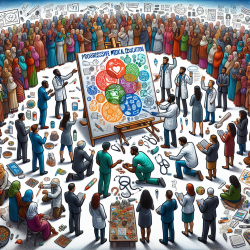The landscape of medical education is continually evolving, yet one area that requires significant attention is the training of healthcare professionals to effectively address the needs of persons living in poverty. Recent participatory action research highlights the importance of integrating the perspectives of both healthcare professionals and individuals living in poverty into medical curricula. This approach not only fosters a deeper understanding of the challenges faced by socioeconomically disadvantaged populations but also equips future healthcare providers with the necessary skills to deliver equitable care.
The Importance of Understanding Poverty in Healthcare
Poverty is a significant determinant of health, influencing both access to healthcare and health outcomes. The research conducted by Hudon et al. (2016) underscores the need for medical training programs to incorporate comprehensive education on the realities of poverty. This includes understanding the socioeconomic conditions that patients face and recognizing how these conditions impact health and healthcare delivery.
Key Findings from Participatory Action Research
- Improving Knowledge: Medical students and residents need enhanced training on poverty and its implications for health. This includes familiarizing themselves with social assistance programs and understanding how financial constraints affect patients' health decisions.
- Fostering Empathy and Understanding: It's crucial for healthcare professionals to not only be aware of but also truly understand the lived experiences of those in poverty. This understanding allows for more empathetic and tailored care.
- Enhancing Communication Skills: Effective communication is as vital as clinical knowledge. Training should emphasize relational skills to build trust and understanding between patients and providers.
- Encouraging Self-Reflection: Healthcare providers must be aware of their biases and limitations. Self-reflection helps in recognizing these biases, leading to more equitable care practices.
Implementing Change in Medical Education
The research advocates for a shift towards experiential learning approaches within medical education. By engaging students in community-based participatory research, they gain firsthand experience with the challenges faced by underserved populations. Such immersive experiences are shown to improve students' competencies and attitudes towards providing care in socioeconomically disadvantaged settings.
This approach aligns with evidence suggesting that partnerships between medical schools and community organizations enhance students' preparedness to serve underserved communities effectively. For instance, involving community members directly in curriculum design ensures that educational content is relevant and impactful.
A Path Forward
The findings from this research call for actionable steps within medical education:
- Merging Knowledge Sources: Incorporate academic, practical, and experiential knowledge into training programs to provide a holistic view of patient care.
- Cultural Competency Training: Develop mandatory curriculum elements focused on cultural competence and social determinants of health.
- Sustainable Community Partnerships: Establish long-term collaborations with community organizations to facilitate ongoing learning opportunities for students.
The ultimate goal is to create a generation of healthcare professionals who are not only clinically proficient but also socially conscious and equipped to address health disparities effectively.
The Call for Further Research
This study serves as a foundation for further exploration into how medical training can be reformed to better meet the needs of diverse populations. Future research should continue to explore systemic factors that influence healthcare access and quality, ensuring that policy-makers and educators remain informed about best practices for achieving health equity.










